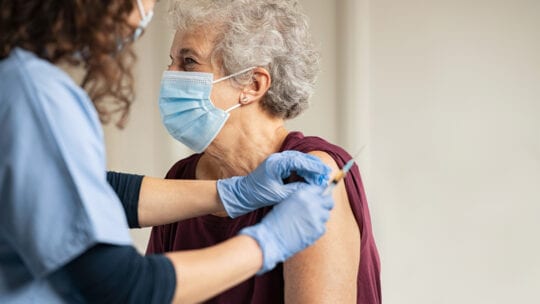
When it comes to COVID-19 vaccine encouragement, the most potent influencer may just be the person who sleeps beside you every night.
New findings from the Kaiser Family Foundation (KFF) indicate that among those resistant to get a vaccine six months ago, one in five previously vaccine-averse individuals now say that have received a vaccine, in part due to family pressure. KFF’s latest report follows up with 878 respondents, including those who said they would not be getting the vaccine in January.
So why the change in sentiment? So far, government PSAs have struggled to move the needle (literally), and per the White House, social media companies have failed to adequately crack down on vaccine misinformation. For the newly converted, the key messengers seem to have been friends and family members who received the vaccine without negative side effects.
Direct conversations with health professionals have also made a difference. Kristie Kuhl, managing partner, global health practice leader, Finn Partners, notes, “Driving action requires trusted sources of information.” Her read of the KFF data is that “those who wanted to ‘wait and see’ but are now vaccinated did so because a loved one or their personal doctor made the person feel comfortable.”
KFF found 21 percent of adults reporting they have been vaccinated out of a group that said in January they would "wait and see" to get vaccinated, would only get the vaccine if mandated by the government or would definitely not get vaccinated. Again, family, friends and doctors made an impact. “Many of these individuals noted the role of their friends and family members as well as their personal doctors in persuading them to get a vaccine,” the report notes. “Seeing their friends and family members get vaccinated without serious side effects, talking to family members about being able to safely visit, and conversations with their personal doctors about their own risks were all persuasive factors for these individuals.”
In terms of messaging, one thing is clear: Dire warnings about the consequences of not being vaccinated—including President Biden’s “they’re killing people” remark about social media platforms—aren’t working. What is working is positive encouragement from those that Americans trust and see every day: their neighbors, spouses and family members.
Driving discussion between the vaccinated and the unvaccinated seems to make a big difference, says Kuhl. “As communicators, we should seek to encourage conversations among those who have been vaccinated with people they know who have not. Changing one person’s mind can have a domino effect.”
And so, it seems that the communicators’ ideal role right now should not be limited to the megaphone blasting out pro-vaccination messaging, but rather to ensure the right people are in the room and comfortable enough to discuss the issue.
A recent New York City Health Department PSA series, “Community Vaxx Stories,” proxies a one-on-one family interaction by interviewing New Yorkers at vaccination sites. The short clips ask subjects to explain why they got the vaccine in multiple languages that reflect New York City’s diverse demographic makeup.
Mirroring KFF’s findings, respondents overwhelmingly point to friends and family—both the need to protect love ones and reunite in person after a long year-plus of separation. One video riffs on the “doctor’s recommendation” approach by interviewing city health workers, a population that is still one-third unvaccinated, according to a recent report.
Another element at play is the ability to resume normal activities once vaccinated, whether that means traveling, visiting restaurants, going to concerts or any other event that requires vaccination before entry. (That includes Bruce Spreengsteen's Broadway run, by the way.)
“Family members and friends who got vaccinated had no serious side effects. Lots of regulations got lifted for vaccinated people,” one woman, part of KFF’s “wait and see” group in January, told pollsters. Travel and tourism communicators, take note: One respondent told researchers that he got vaccinated knowing he wouldn’t be able to take a Bahamas vacation without a shot.
Based on KFF’s findings, it seems the best communications road forward is messaging that improves access to doctors’ opinions, reminds us we’re all overdue to visit grandma, and, perhaps, for those looking to get away this summer—temptingly paints a picture of a beachside sunset, piña colada in hand.
Sophie Maerowitz is senior content manager at PRNEWS. Follow her @SophieMaerowitz.
